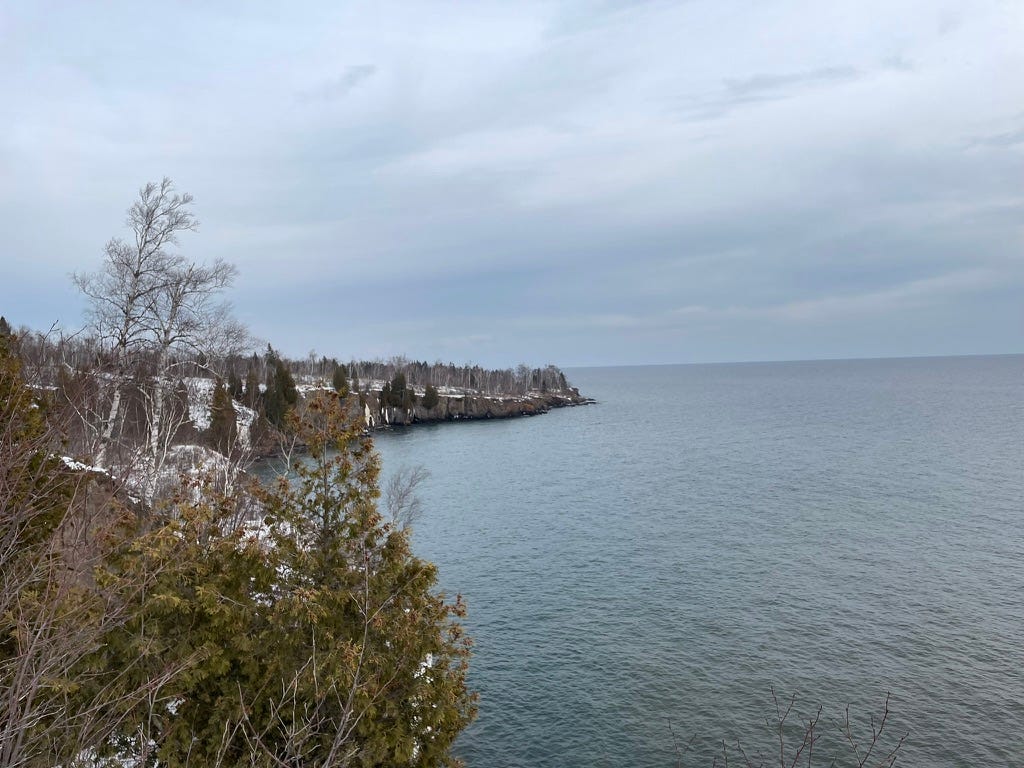Almost two full months have elapsed since my brother-in-law died unexpectedly. Since then, one experience that helped me tap into acceptance was a weekend trip to the North Shore of Lake Superior with my spouse. It was an unseasonably warm January weekend, and we hiked snow-packed paths with overlooks of the vastness of Gichigami (the Ojibwe word for the Great Lake). Being a small person in an expansive landscape showed me how my family and I are relatively insignificant parts of nature. I reflected on the cyclical seasons and the natural patterns of life and death. Of course death happens unexpectedly, I was able to reason that weekend. Of course unexpected death can happen in our family. Why not in our family? While there are still times when I feel heartbroken or bereft or angry over my brother-in-law’s death, images of the North Shore landscape have served as a touchstone to remind me of acceptance.
In the meantime, I have been inhaling grief and loss—and, I suppose, exhaling some sense of peace and acceptance—through my reading. Describing my reading habits recently, I searched for the right words to explain that memoirs centered on others’ tragedies have, like Gichigami, reminded me that death is a continual part of the way the world works. My reading has helped me release tears and sadness and, above all, helped me feel less alone in my grief, especially when I read a writer’s spot-on description of my own emotions.
Here is an annotated chronological list of what I’ve read so far in 2023:
When Breath Becomes Air by Paul Kalanithi - a neurosurgeon shares his experience of decline following his diagnosis with lung cancer; his spouse writes an epilogue after his death.
Lost & Found by Kathryn Schulz - a writer describes her experience of losing her beloved father and finding her partner and the curious intersections of losing and finding different people and things and experiences throughout life.
Crying in H Mart by Michelle Zauner - the lead vocalist of the indie-pop band Japanese Breakfast reflects on her relationship with her mother who died at age 56 of pancreatic cancer; Zauner finds comfort in learning to cook Korean foods she grew up eating.
When Death Takes Something from You Give it Back by Naja Marie Aidt - a Danish poet absorbs the reality of her son’s tragic death and tries to return to a meaningful life.
Blue Nights by Joan Didion - Following the deaths of both her husband and her only daughter, Didion reflects on motherhood, marriage and aging.
No Happy Endings by Nora McInerny - Nora writes with levity and love about the crossroads of loving both her husband who died of brain cancer at age 35 and her “current” husband.
At this point, I have run out of grief memoirs that appeal to me (though if you have recommendations, I’d like to know what they are).* This week I’m moving on to books about aging as I ponder and imagine what it means for me to live into the second half of my life while my dead-at-age-50 brother-in-law doesn’t have that opportunity. I want hold both an awareness of mortality and a feeling of awe about life. I don’t want to avoid the topic of death or to act like my heart isn’t broken by the death of a loved one. Opposite from the Stevie Smith poem, I am waving not drowning. I am not wallowing but grieving.
* It might be helpful to know that I have previously read Joan Didion’s The Year of Magical Thinking as well as C.S. Lewis’s A Grief Observed plus books by Elisabeth Kübler-Ross.

